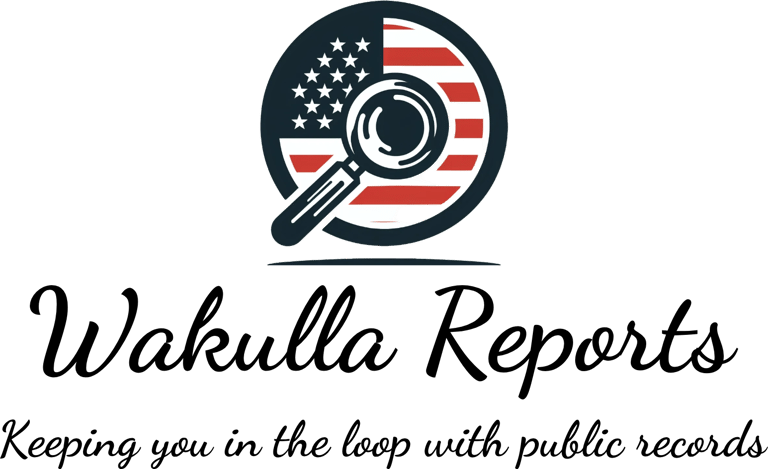Florida’s Two-Party Consent Law and Why It Needs a Rethink
A previous post exposed allegations of a county attorney pressuring a whistleblower, whose recording of the incident may be inadmissible under Florida’s two-party consent law. This follow-up explores that law’s limits, using the case as a springboard to argue for reform, especially when the whistleblower faced a home search after cooperating.
2025ANNIE RANTSELECTED AND NON ELECTED OFFICIALS
Aggie Christie
4/2/20254 min read


At Wakulla Reports, we’re committed to keeping our community in the know and sparking tough conversations. A reader recently nudged us to take a hard look at Florida’s two-party consent law—especially after our coverage of the alleged witness intimidation involving a county attorney and local lawyers. Under Fla. Stat. § 934.03, recording a private conversation without everyone’s consent is a felony, and those recordings are often inadmissible in court. This blog digs into the law, connects it to Wakulla County’s latest drama reveal, compares it to other states, and makes the case for switching to one-party consent—or at least amending the law to allow recordings of crimes or public interest.
Florida’s Two-Party Consent Law: The Basics
In Florida, if you’re in a private conversation with a reasonable expectation of privacy, everyone involved has to greenlight being recorded. Step over that line, and it’s a third-degree felony—up to five years in prison and a $5,000 fine. That’s stricter than the 38 states and Washington, D.C., where one-party consent rules: if you’re part of the talk, you can record without telling a soul, per federal law (18 U.S.C. § 2511). States like Texas and Georgia roll with this flexibility, while Florida hangs with a tougher crowd—California, Maryland, and a few others—putting privacy on a pedestal.
Wakulla County: Witness Intimidation and Government Cameras
Our recent piece, "Another Conspiracy: Wakulla County Attorney and Lawyers Accused of Witness Intimidation," lit this fuse. A whistleblower claims they recorded a county attorney pressuring them to tweak testimony in a legal dispute—a potential felony. Florida’s two-party law throws a wrench in: without the attorney’s consent, that recording’s likely dead in court, even if it nails the crime. Here’s the gut punch—after the whistleblower handed over the recordings to authorities, their house got searched. You cooperate, and they rummage through your life? That’s a bitter pill.
Meanwhile, Wakulla County’s new surveillance cameras are up in government buildings, snagging crime in public spaces where privacy’s off the table. The county says it’s for safety, and legally, they’re golden. So, the government can watch us, but a citizen recording to call out misconduct risks jail—and a home search? That double standard’s glaring.
Florida vs. Other States
In one-party states like New York, the whistleblower’s recording could hit the courtroom, no consent required, as long as they were in the conversation. Florida’s law might bury it, letting the accused skate. California carves out exceptions for felonies like extortion, but Florida’s are tight—law enforcement, child abuse, public settings.
Why We Need Change
Florida’s law can protect the wrong people, and Wakulla’s mess shows it. Here’s why one-party consent—or an amendment—makes sense:
Nailing Criminals: If the whistleblower’s recording proves tampering, it should count. In one-party states like Virginia, it would. Allowing “damning criminal information” (e.g., felonies) in court could nab the guilty.
Holding Power Accountable: This involves a public official. Recordings in the “public interest”—like government misconduct—should be fair game. One-party states like New Jersey nail this.
Matching Government Power: County cameras watch us for safety. Why can’t we record back when it matters, especially when cooperation gets your house searched? One-party consent fits the smartphone era.
Keeping It Honest: Privacy concerns—recordings twisted—are real, but courts can sift truth. An amendment could add judicial oversight, limiting use to serious crimes or public good, with penalties for abuse.
A Reader’s Push, Our Take
Big thanks to the reader who flagged this—it’s a wake-up call. Our witness intimidation story shows a law meant to guard privacy can shield wrongdoers. If the county can use cameras, why can’t we use our phones to demand accountability? And when a whistleblower steps up, only to face a home search, the system’s skewed. One-party states don’t tie citizens’ hands like this—Florida needs to catch up.
What Do You Think?
Changing this law is a state-level fight. We’re skipping comments here—our topics spark enough fire—but we want your voice out there. Talk to your neighbors, hit up elected officials, even reach out to your state senators and representatives. Should Florida stick with two-party consent, or is it time for reform? Let’s get this on their desks—Wakulla, and all Floridians, deserve a system that puts justice over technicalities.
Extra Reading: Florida Cases Where the Law Blocked Justice
Florida’s two-party consent law has left some brutal scars—cases where evidence of heinous crimes got tossed because of a technicality. Here’s a deeper look at two that hit hard:
McDade v. State (2014): A stepdaughter endured six years of sexual abuse from her stepfather, an ice cream truck operator. She secretly recorded him with her MP3 player, capturing undeniable proof of his assaults—evidence that backed her testimony and led to a life sentence in lower courts. But the Florida Supreme Court stepped in and flipped it. The stepfather didn’t consent to being recorded in his home, where he had a “reasonable expectation of privacy.” The recordings were ruled inadmissible, despite her being a minor and the abuse being crystal clear. Without that audio, the case weakened, and he got a new trial. Privacy won, but a child’s justice lost—leaving a sour taste and fueling calls for change that haven’t yet stuck.
Panama City Beach Domestic Violence Case (2020): This one’s not a high-profile ruling but a real-world nightmare, detailed by attorney Albert J. Sauline III. A woman in a messy divorce secretly recorded her husband threatening her—chilling audio that proved he meant harm. She handed it over, hoping for a restraining order or prosecution, but Florida’s law said no dice. He didn’t consent, so the evidence was useless in court. Then it got worse—she faced felony charges for making the recording, turning her from victim to defendant. Her husband walked free, while she fought legal blowback. It’s a stark example of how the law can flip the script, punishing the person trying to protect themselves.
These cases sting because they show victims fighting to be heard, only to have the law slam the door. In one-party states like Texas or New York, those recordings could’ve locked up the offenders. Here, they’re trash—proof sidelined by a rule that sometimes feels more like a shield for the guilty. Think about these as you talk this over with your reps—real people, real pain, real reasons to rethink this law.

Additional Social Links
YouTube is your go-to for short clips, video explainers, and visual breakdowns of how Florida and Wakulla governments really work.
Facebook brings you bite-sized written content, sticky-note facts, and rolling updates you can share and discuss.
Prefer to browse at your own pace?
Bookmark our website and visit anytime for fresh posts, resources, and real-life examples from right here in Wakulla County.
© 2024. All rights reserved.
